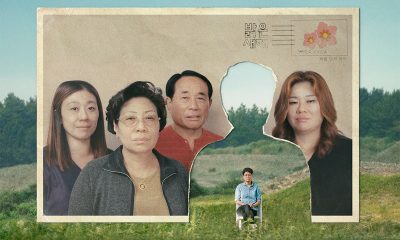World
Out in the World: LGBTQ news from Europe and Asia
Nonbinary Swiss singer Nemo won this year’s Eurovision

EUROVISION
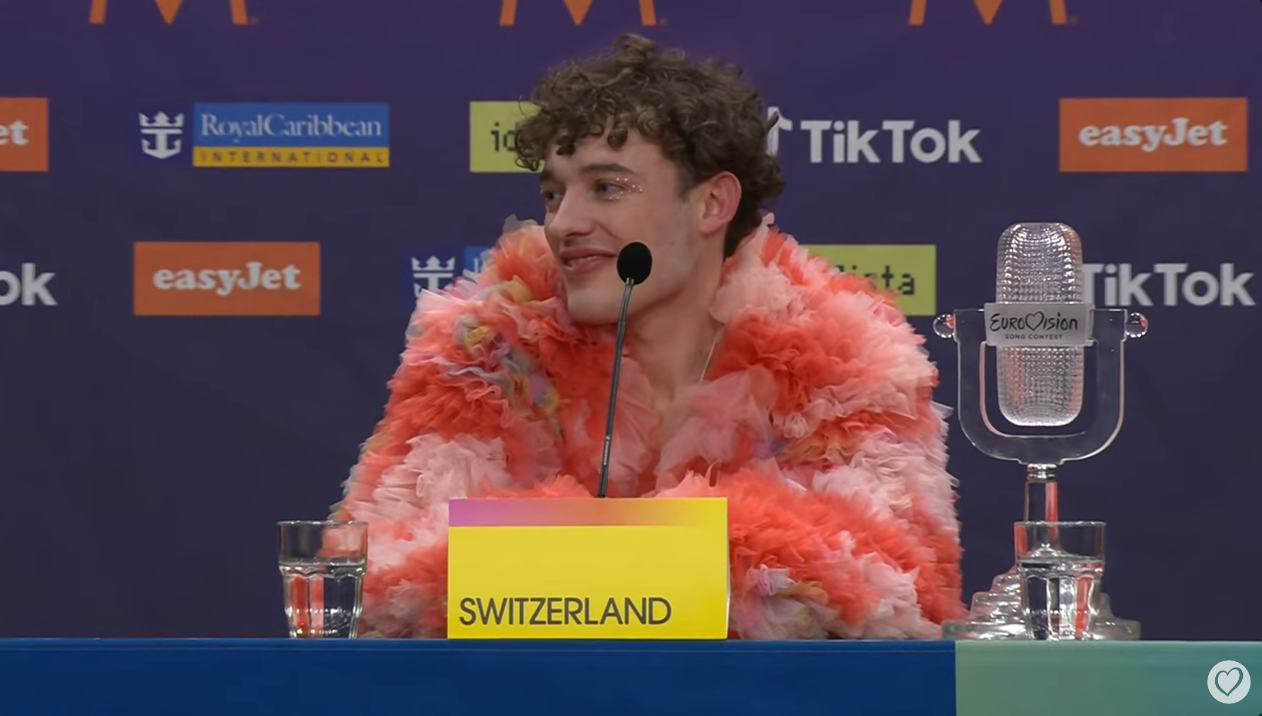
Swiss singer Nemo won the Eurovision Song Contest with their operatic pop-rap song “The Code” about their journey to accepting their nonbinary identity.
“I went to hell and back, to find myself on track, I broke the code,” Nemo sang in the chorus of their winning song.
Dressed in a frilly pink blouse and miniskirt, Nemo dazzled the audience at the Malmö Arena in Sweden, home to last year’s winner, Loreen.
Nemo’s win is the first win for Switzerland since Canadian singer Celine Dion competed under the Swiss flag in 1988.
The Eurovision Song Contest is an annual competition held by the European Broadcasting Union since 1956, in which representatives of all member states present original songs. The entrants are voted upon by a panel of judges and by viewing audiences, who award points to their 10 favorite performances.
Over the years, the competition has become well-known as a camp spectacle and a favorite event for the European LGBTQ community, with many high-profile queer competitors and winners, including Austrian drag queen Conchita Wurst, who returned to this year’s show to perform a tribute to ABBA, who won the competition for Sweden with the song “Waterloo” in 1974.
This year’s UK entrant was nonbinary performer Olly Alexander, formerly of the band Years & Years. Their song “Dizzy,” a homoerotic pop-dance track that featured a quartet of dancing boxers, finished in 18th place with only 46 points, after receiving no points from the voting audience.
This year’s competition was not without controversy.
The venue was met with a large protest demanding that Israel, which has competed in Eurovision since 1973, be removed from the competition due to the ongoing war in the Gaza Strip. Additional security measures were put in place for the competition
Israel’s entrant, Edan Golan, had been a favorite early in the competition, but her song “Hurricane” finished fifth. The song had also drawn controversy, and Golan was ordered to change the title and lyrics by the EBU from “October Rain” due to its references to the Oct. 7 attacks on Israel.
Golan travelled with agents of the Israeli Security Agency Shin Bet after death threats were made on her social media.
Additionally, Dutch performer Joost Klein was disqualified ahead of the final competition after an alleged altercation with a female production staffer that has led to a police investigation.
UNITED KINGDOM
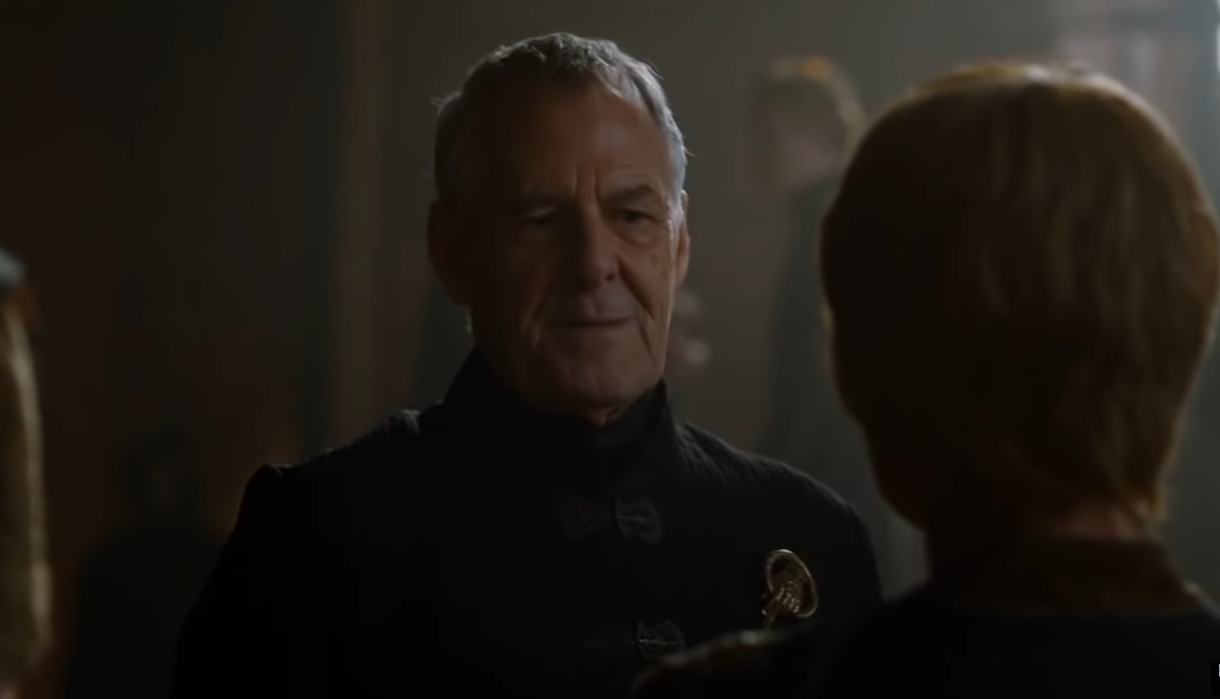
Actor Ian Gelder, best known for his role as Kevan Lannister in the HBO series “Game of Thrones,” has passed away at age 74, five months after he was diagnosed with an aggressive form of cancer.
Gelder’s husband, Ben Daniels, announced his passing in a post on Instagram on Tuesday.
“It is with huge, huge sadness and a heavy heart broken into a million pieces that I’m leaving this post to announce the passing of my darling husband and life partner Ian Gelder,” Daniels wrote in the caption of a photo taken of the couple at Christmas, shortly after Gelder’s first round of treatment for his cancer.
“He was my absolute rock and we’d been partners for more than 30 years. If we weren’t together, we spoke to each other every day. He was the kindest, most generous spirited, and loving human being. He was a wonderful, wonderful actor and everyone who worked with him was touched by his heart and light,” Daniels wrote.
Gelder was diagnosed with bile duct cancer in December. Such cancers are often not detected by health care providers until they have spread to other parts of the body.
Gelder had a long career in film and television and on the British stage, frequently appearing in London’s West End and Shakespeare’s Globe Theatre.
Among his numerous television appearances was a stint on the “Doctor Who” spinoff “Torchwood,” and the celebrated UK sitcom “Absolutely Fabulous.”
POLAND
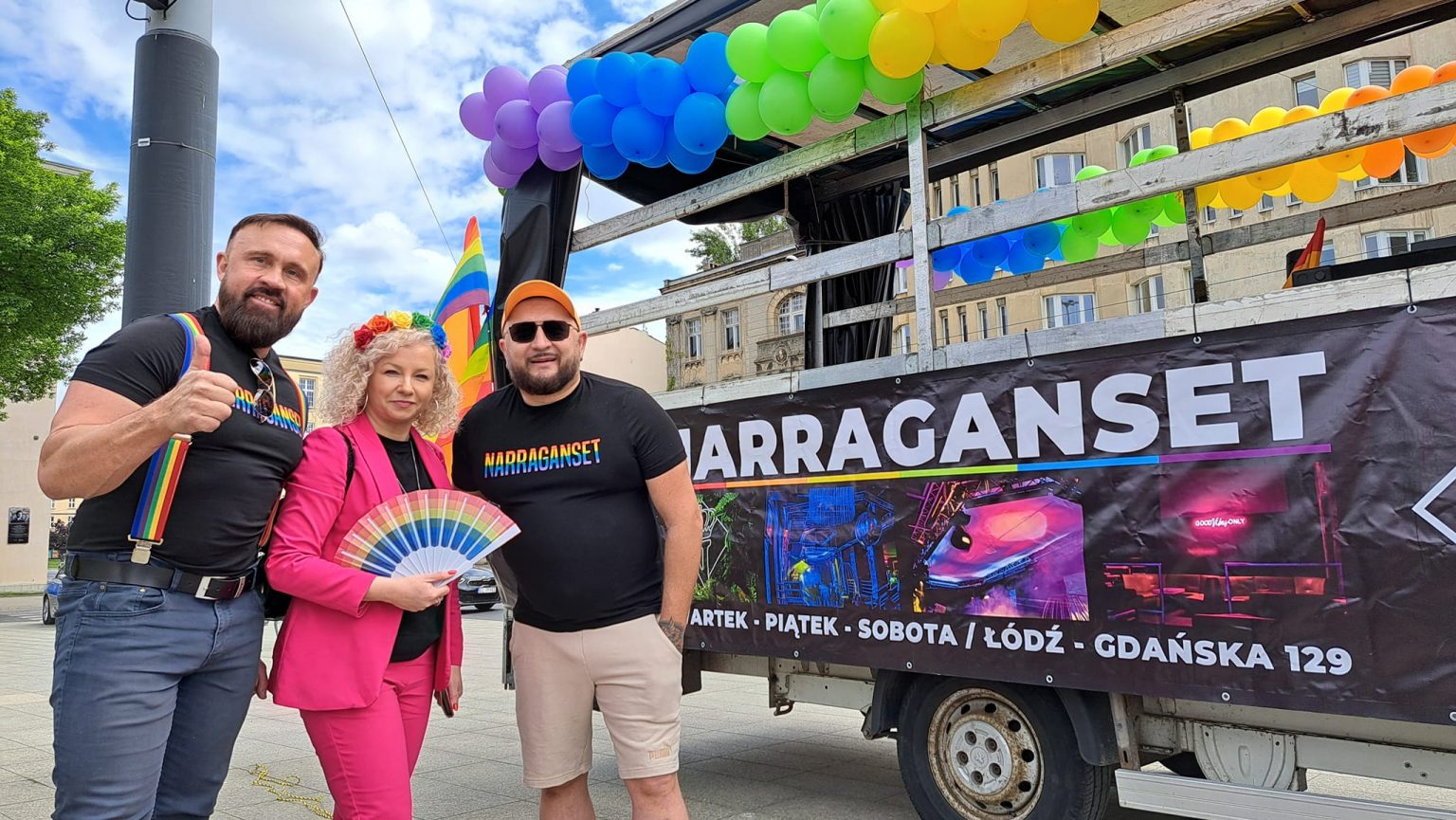
Declaring that she would “go to hell and make a deal with the devil” to advance the rights of Poland’s LGBTQ community, Equalities Minister Katarzyna Kotula joined the Equality March in Łódź, the country’s fourth-largest city, on May 11.
The march was the 13th edition of the event, and the first time it had been attended by a government minister.
Last year, Poland elected a new government coalition of center-left leaning parties that have pledged to support LGBTQ rights, a sharp contrast to the right-wing, LGBTQ-hostile government that preceded them.
Still, the government has been slow to act on its stated promises to the LGBTQ community, including a law on civil unions, a ban on hate speech, and a gender recognition act, amid squabbling from more conservative members of the coalition.
Kotula has said that she’s waiting to introduce the civil union bill until she can get agreement from the coalition on key sticking points, including adoption rights.
“For civil partnerships, for marriage equality, for the Gender Reconciliation Act, for dignity and human rights for the LGBT community, I will go to hell and make a pact with the devil. I promise that when we meet here next year, at least some of these demands will be implemented,” Kotula said at the march. “I will do everything to take care of your dignity and your safety.”
The organizers of the march, the Equality Factory, are calling for even greater rights, including full marriage equality, abortion and contraception rights, comprehensive sex education in schools, and facilitation of medical treatment for gender transition.
“We are marching because words about equality cannot be thrown around. We are not a bargaining chip. We were promised something and the election promises should be fulfilled. The most important requirement to be implemented is the act on civil partnerships. This is not only about LGBTQ+ people, but also about protecting heterosexual people in relationships, because there is no such thing as cohabitation in Polish law. This should be important for all Poles,” Ida Mickiewicz-Florczak from the Equality Factory told the Polish news site Odaka.
Even if the civil partnership law passes through Parliament, it may face a veto from President Andrzej Duda of the opposition Law and Justice Party, which has vociferously opposed LGBTQ rights. So far, Duda, who will be in office until presidential elections in May 2025, has not indicated how he will act on the bill, stating he’s waiting until it is introduced to comment.
SOUTH KOREA
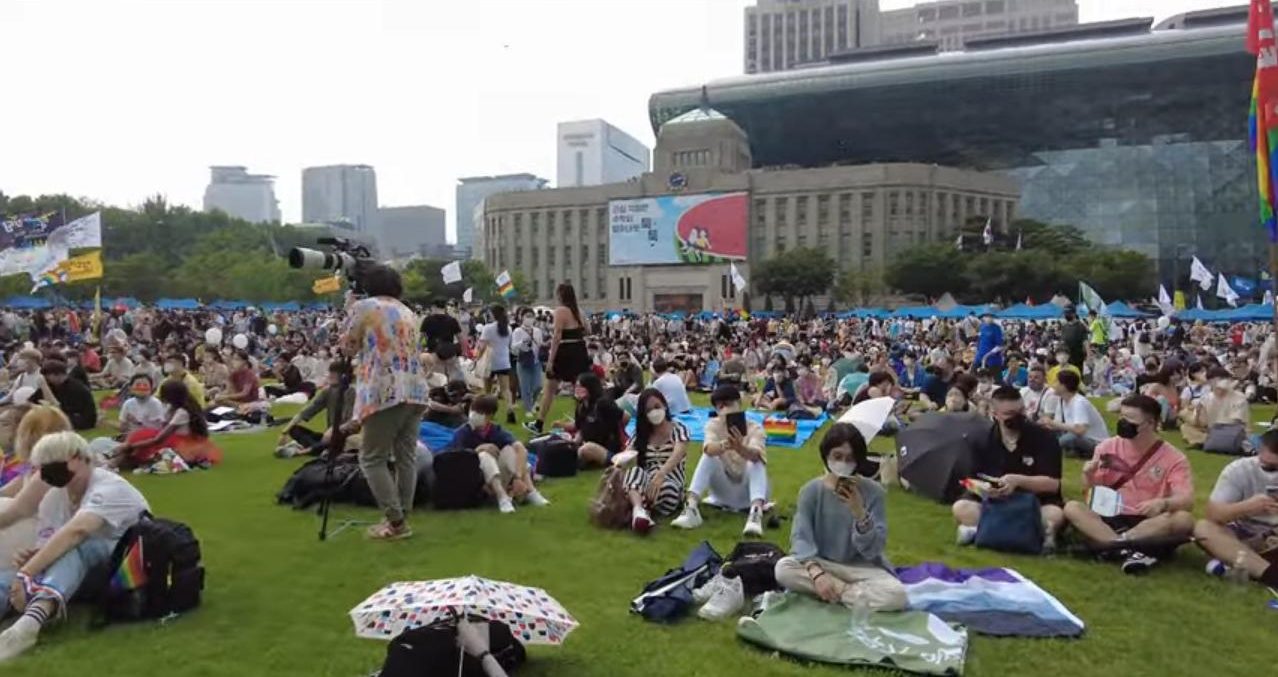
The Seoul Queer Culture Festival has found a new home after two years of struggle with the city council repeated denying permits for the annual festival.
The Queer Culture Festival had been held at Seoul Plaza at City Hall ever since 2015, but last year it was denied a permit, which the conservative-leaning city council decided to give to a Christian youth concert instead. This year, the city council has announced that the plaza is being used for a outdoor library all through spring and summer, effectively blocking all event applications.
“I think Seoul city is focusing on events that only suit its taste,” Yang Sun-woo, chief organiser of the festival, told Reuters. “If Seoul cared about LGBT people, they would have understood the significance of the event.”
In response, organizers of the Queer Culture Festival have decided this year’s edition will take place on a several blocks in downtown Seoul, which only required the permission of police, rather than city council.
The festival, which takes place over two weeks in June, kicks off with a parade on June 1 and will feature a queer film festival, live performances, and 60 booths for vendors and interactive events.
For its part, Seoul City Council denies that anti-LGBTQ discrimination played a part in its decision to twice deny permits for the event.
The city government said it is “always listening to voices and providing necessary support to protect human rights of LGBTQ people as members of society,” in a statement.
The Queer Culture Festival was also denied a permit by the Seoul History Museum.
The U.S. Embassy in Seoul will also support the event, as it has in previous years.
“As in past years, embassy representatives will join in Pride events worldwide, including here in the Republic of Korea, to raise awareness of the challenges faced by LGBTQI+ individuals,” the embassy told Reuters in a statement.
AUSTRALIA
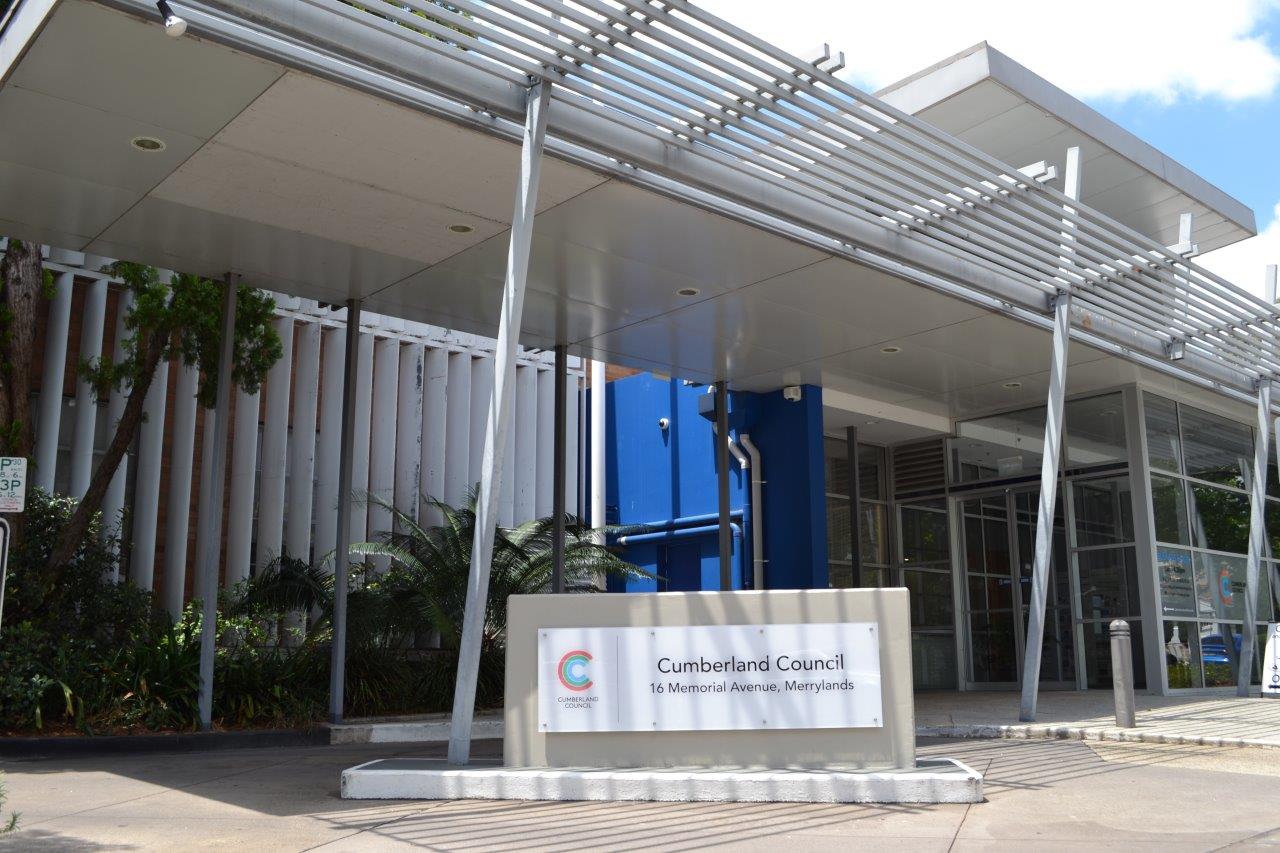
Cumberland in New South Wales drew international headlines this week after its city council voted 6-5 to ban books on same-sex parenting from local libraries. Four council members were not present for the May 1 vote.
The motion amends the council’s library strategy to order “that council take immediate action to rid same sex parents books/materials in council’s library service.”
The move from the council, which represents around 250,000 people in the western suburbs of Sydney, was swiftly condemned by residents, LGBTQ leaders, and representatives of the state government.
New South Wales Attorney General Michael Daley has referred the motion to the state’s Anti-Discrimination Board for advice, while Arts Minister John Graham has warned the council that the new policy directive puts state library funding for the council in jeopardy, as it would breach public library guidelines. He’s asked council to reconsider the ban.
“It’s a terrible message to send, to have this councilor importing this US culture war into our country and playing it out on the shelves of the local library,” Graham said on a morning television show. “I think the community expectations are clear — the local councilor should be coming around to pick up their bin, not telling them what to read.”
Cumberland’s local council is dominated by the relatively LGBTQ-friendly Australian Labor Party, but the motion from Our Local Government Party Councilor Steve Christou carried with support from Liberal-Party-affiliated Independents and a single vote from a Labor councilor, who has since been condemned by the party.
The move comes just a few months after the same council voted to ban drag queen storytime events at local libraries.
Christou says the motion was inspired after he received complaints from constituents who saw the book “Same-Sex Parents” by Holly Duhig on display in the children’s section of a library. The book explores what it’s like to have two moms or two dads from a child’s perspective.
During the debate on the motion, Christou alleged that the book “sexualized” children and repeated dog-whistle allegations against queer people and parents.
“We’re going to make it clear tonight that … these kind of books, same-sex parents books, don’t find their way to our kids,” Christou said, according to the Guardian. “Our kids shouldn’t be sexualized.”
Christou said the proposed amendment was “for the protection and safety of our children.”
“Hands off our kids,” he repeated.
Christou has said the amendment was demanded by his community, which he says is a “very religious community,” despite the fact that a petition against the amendment garnered more than 10,000 signatures in 24 hours.
“This community is a very religious community, a very family-orientated community.
“They don’t want such controversial issues going against their beliefs indoctrinated to their libraries. This is not Marrickville or Newtown, this is Cumberland City Council.”
The petition was launched by a Cumberland area grandmother to what she describes as a “rainbow family” Caroline Staples. Staples will present her petition to the council on May 15.
Colombia
Claudia López criticizes Trump over threats against Colombian president
Presidential candidate would become country’s first lesbian head of government
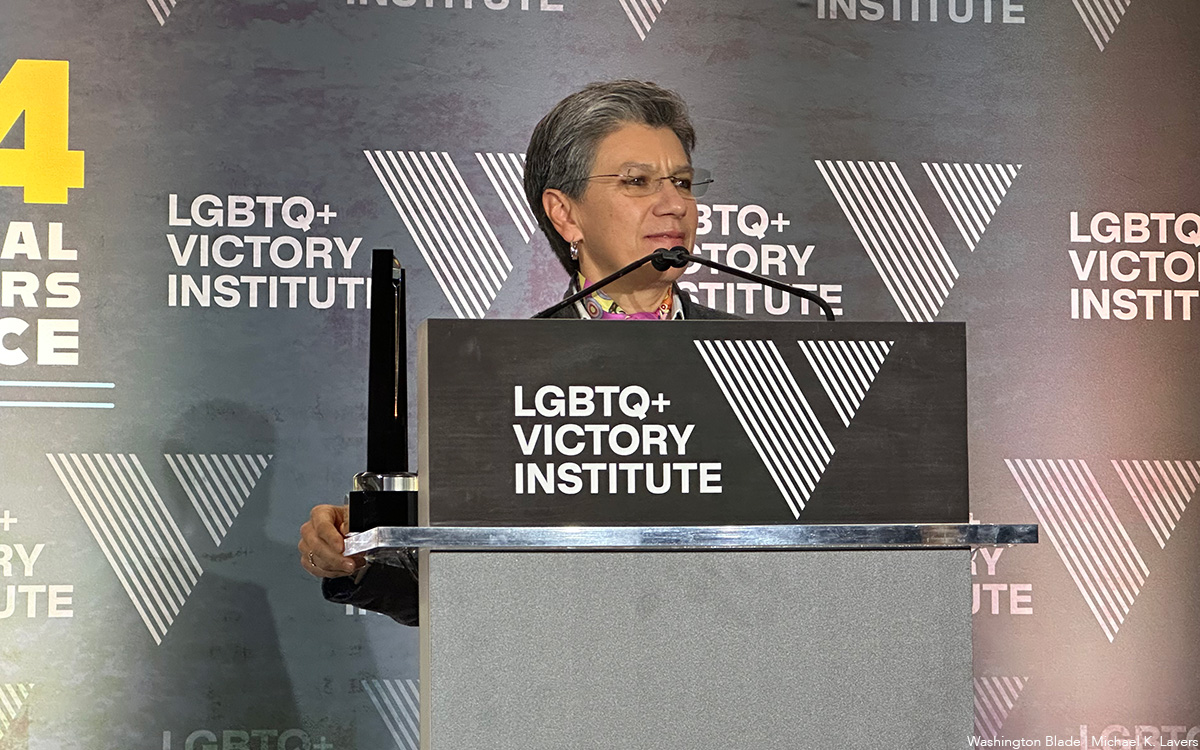
BOGOTÁ, Colombia — Colombian presidential candidate Claudia López has criticized President Donald Trump after he suggested the U.S. will target Colombian President Gustavo Petro.
“Colombia is very sick, too, run by a sick man, who likes making cocaine and selling it to the United States, and he’s not going to be doing it very long,” Trump told reporters on Air Force One on Sunday.
Trump made the comments a day after American forces carried out an overnight operation and seized now former Venezuelan President Nicolás Maduro and wife, Cilia Flores, at their home in Caracas, the Venezuelan capital.
Maduro and Flores on Monday pleaded not guilty to federal drug charges in New York.
Petro is a former Bogotá mayor and senator who was once a member of the M-19 guerrilla movement that disbanded in the 1990s. He has urged Colombians to take to the streets and “defend national sovereignty.”
“Colombians are the ones who decide who governs Colombia,” said López on her X account. “President Gustavo Petro won free elections and has a constitutional mandate.”
López did not mention Trump by name in her comment.
The first-round of Colombia’s presidential election will take place on May 31. The country’s 1991 constitution prevents Petro from seeking re-election.
López in 2019 became the first woman and first lesbian elected mayor of Bogotá, the Colombian capital and the country’s largest city. She took office on Jan. 1, 2020, less than a month after she married her wife, Colombian Sen. Angélica Lozano.
“This year we will decide at the polls what direction (the country) is heading and what leadership will advance Colombia,” said López in her X post. “Supporting soft dictatorships and attacking democracies is an absurd and unacceptable political action by the United States towards Colombia, Venezuela, and Latin America.”
Quién gobierna en Colombia lo decidimos los colombianos.
El presidente @petrogustavo ganó unas elecciones libres y tiene un mandato constitucional. Este año decidiremos en las urnas qué rumbo y a cargo de qué liderazgo avanza Colombia.
Sostener dictablandas y atacar democracias… https://t.co/K61G2QUcck— Claudia López Hernández (@ClaudiaLopez) January 5, 2026
López would be Colombia’s first female president if she wins the election. López would also become the third openly lesbian woman elected head of government — Jóhanna Sigurðardóttir was Iceland’s prime minister from 2009-2013 and Ana Brnabić was Serbia’s prime minister from 2017-2024.
The LGBTQ+ Victory Institute in 2024 honored López at its annual International LGBTQ Leaders Conference in D.C. The Washington Blade interviewed her during the gathering.
Colombia
Blade travels to Colombia after U.S. forces seize Maduro in Venezuela
Former Venezuelan president, wife seized on Saturday
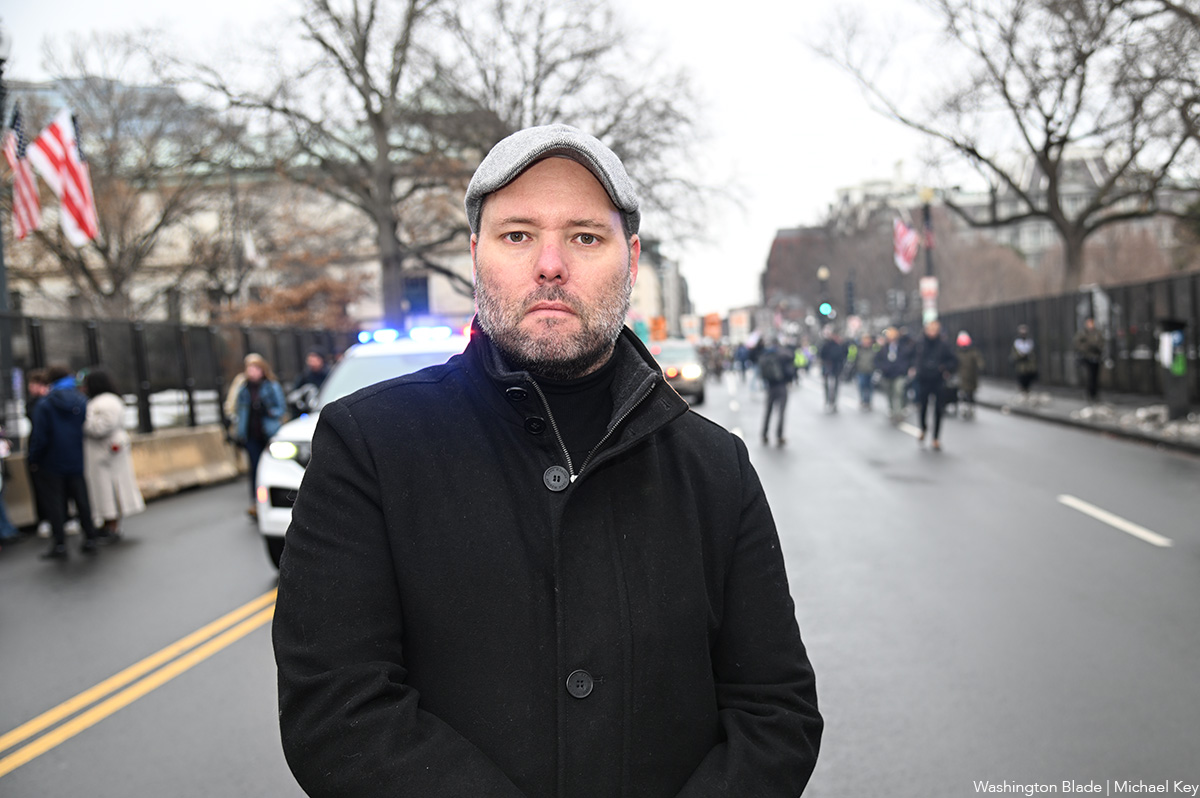
Washington Blade International News Editor Michael K. Lavers will be on assignment in Colombia through Jan. 10.
Lavers arrived in Bogotá, the Colombian capital, on Monday. American forces two days earlier carried out an overnight operation and seized now former Venezuelan President Nicolás Maduro and wife, Cilia Flores, at their home in Caracas, the Venezuelan capital.
Maduro and Flores on Monday pled not guilty to federal drug charges in New York.
Maduro in 2013 became Venezuela’s president after his predecessor, Hugo Chávez, died.
The country’s ongoing economic and political crises have prompted millions of Venezuelans to flee to neighboring Colombia and other countries throughout Latin America and around the world. The seizure of Maduro and Flores threatens to further destabilize Venezuela and the broader region.
The Washington Blade, which has reported from Colombia several times over the last decade, has interviewed several LGBTQ Venezuelan opposition leaders. The Blade has also extensively covered the plight of LGBTQ Venezuelans and Venezuelans with HIV/AIDS who have left their country because of violence, persecution, discrimination, and a lack of medications.
“LGBTQ Venezuelans in Colombia and elsewhere have a unique perspective on the events that have transpired in their homeland over the last two days, and how they continue to reverberate throughout the hemisphere,” said Lavers. “It is critically important for the Washington Blade to document the situation in the region as it continues to evolve and to show how it will impact LGBTQ communities.”
“The Blade has a long history of covering the plight of LGBTQ communities around the world and this trip reflects our commitment to the region,” said Blade Editor Kevin Naff. “This reporting will help shine a light on the challenges facing LGBTQ Venezuelans and those living with HIV and how they are coping with the unfolding events.”
Lavers last reported from Colombia in 2021. His coverage included a trip to Cúcuta, a Colombian city that is on the country’s border with Venezuela.
World
Top 10 international LGBTQ news stories of 2025
Marriage progress in Europe; trans travel advisories depress WorldPride attendance
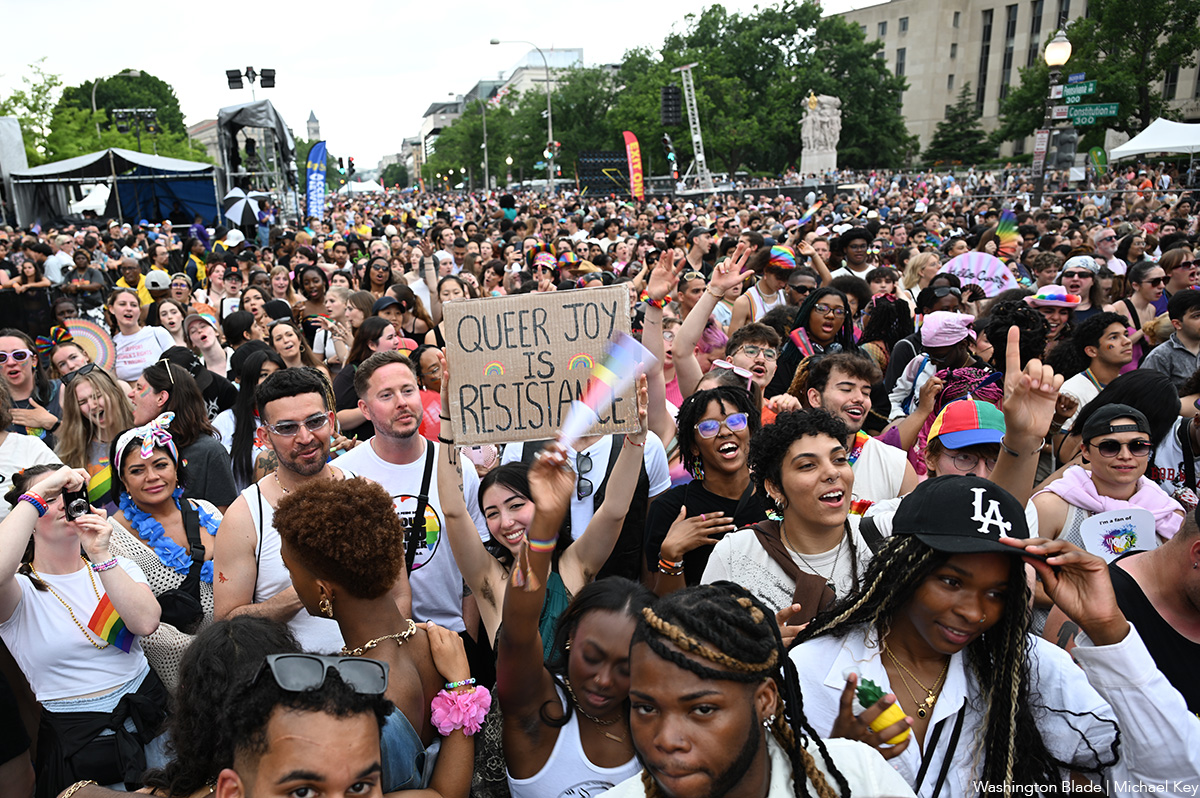
The Trump-Vance administration and its policies had a significant impact on the global LGBTQ rights movement in 2025. War, anti-LGBTQ crackdowns, protests, and legal advances are among the other issues that made headlines around the world over the past year.
Here are the top international stories of 2025.
10. Australia ends ban on LGBTQ blood donors
Australia on July 14 ended its ban on sexually active LGBTQ people from donating blood.
“Lifeblood (the Australian Red Cross Blood Service) has been working to make blood and plasma donation more inclusive and accessible to as many people as possible, whilst maintaining the safety of the blood supply,” said the Australian Red Cross Blood Service in a press release that announced the new policy.
Lifeblood Chief Medical Officer Jo Pink said the new policy will allow 24,000 additional people to donate blood each year.
9. Kenyan judge rules gov’t must legally recognize trans people
A Kenyan judge on Aug. 20 ruled his country’s government must legally recognize transgender people and ensure their constitutional rights are protected.
Justice Reuben Nyakundi of the Eldoret High Court in western Kenya ruled in favor of a trans athlete who was arrested in 2019 and forced to undergo a medical examination to determine her gender. The 34-year-old plaintiff who is a board member of Jinsiangu, a trans rights organization, said authorities arrested her at a health facility after they claimed she impersonated a woman.
“This is the first time a Kenyan court has explicitly ordered the state to create legislation on transgender rights, and a first in the African continent,” noted Jinsiangu in a statement. “If implemented, it could address decades of legal invisibility and discrimination faced by transgender persons by establishing clear legal recognition of gender identity, protection against discrimination in employment, housing, healthcare, and education, and access to public services without bias or harassment.”
8. U.S. withdraws from UN LGBTI Core Group
The U.S. in 2025 withdrew from the U.N. LGBTI Core Group, a group of U.N. member states that have pledged to support LGBTQ and intersex rights.
A source told the Washington Blade the U.S. withdrew from the Core Group on Feb. 14. A State Department spokesperson later confirmed the withdrawal.
“In line with the president’s recent executive orders, we have withdrawn from the U.N. LGBTI Core Group,” said the spokesperson.
7. Wars in Gaza, Ukraine continue to make headlines
Israeli airstrikes against Iran prompted authorities in Tel Aviv to cancel the city’s annual Pride parade that was scheduled to take place on June 13.
The airstrikes prompted Iran to attack Israel with drones and missiles. One of them destroyed Mash Central, a gay bar that was located a few blocks from the U.S. Embassy in Tel Aviv. Marty Rouse, a longtime activist who lives in Maryland, was in Israel with the Jewish Federations of North America when the war began. He and his group left the country on June 15.
Bet Mishpachah, an LGBTQ synagogue in D.C., welcomed the tenuous ceasefire between Israel and Hamas that took effect on Oct. 10, roughly two years after Hamas militants killed upwards of 1,200 people and kidnapped more than 200 others when they launched a surprise attack on the country.
In Ukraine, meanwhile, the war that Russia launched in 2022 drags on.
6. Int’l Criminal Court issues arrest warrants for Taliban leaders
The International Criminal Court on July 8 issued arrest warrants for two top Taliban officials accused of targeting LGBTQ people, women, and others who defy the group’s strict gender norms.
The warrants are for Hibatullah Akhundzada, the Taliban’s supreme leader, and Afghanistan Chief Justice Abdul Hakim Haqqani.
Karim Khan, the ICC’s chief prosecutor, in January announced a request for warrants against Taliban officials over their treatment of women and other groups since they regained control of Afghanistan in 2021. The request marked the first time the court specifically named LGBTQ people as victims in a gender persecution case before it.
5. Hundreds of thousands defy Budapest Pride ban
More than 100,000 people on June 28 defied the Hungarian government’s ban on public LGBTQ events and participated in the 30th annual Budapest Pride parade.
Former Irish Prime Minister Leo Varadkar, who is his country’s first openly gay head of government, and openly gay MEP Krzysztof Śmiszek, who was previously Poland’s deputy justice minister, are among those who participated in the march.
Hungarian Prime Minister Viktor Orbán and his Fidesz-KDNP coalition government have faced widespread criticism over its anti-LGBTQ crackdown.
Hungarian lawmakers in March passed a bill that bans Pride events and allow authorities to use facial recognition technology to identify those who participate in them. MPs in April amended the Hungarian constitution to ban public LGBTQ events.
4. LGBTQ delegation travels to Vatican to meet Pope Leo after Francis dies
Pope Francis died on April 21.
The Vatican’s tone on LGBTQ and intersex issues softened under the Argentine-born pope’s papacy, even though church teachings on homosexuality and gender identity did not change.
The College of Cardinals on May 8 chose Pope Leo XVI, an American cardinal from Chicago who was bishop of the Diocese of Chiclayo in Peru from 2015-2023, to succeed Francis.
Leo on Sept. 1 met with the Rev. James Martin, a Jesuit priest who founded Outreach, a ministry for LGBTQ Catholics. A gay couple from D.C. — Jim Sweeney and the Rev. Jason Carson Wilson — are among those who took part in an LGBTQ pilgrimage to the Vatican a few days later that coincided with the church’s year-long Jubilee that began last Christmas Eve when Francis opened the Holy Door.
3. EU’s top court rules states must recognize same-sex marriages
The European Union’s top court on Nov. 25 ruled member states must recognize same-sex marriages legally performed in other member states.
The EU Court of Justice in Luxembourg ruled in favor of a couple who challenged Poland’s refusal to recognize their German marriage.
The couple who lives in Poland brought their case to Polish courts. The Polish Supreme Administrative Court referred it to the EU Court of Justice.
“Today’s ruling of the Court of Justice of the EU is of key importance not only for the couple involved in the case, but also for the entire LGBT+ community in Poland,” said the Campaign Against Homophobia, a Polish LGBTQ and intersex rights group.
2. U.S. funding cuts devastate global LGBTQ community
The Trump-Vance administration’s decision to cut U.S. foreign aid spending in 2025 has had a devastating impact on the global LGBTQ rights movement.
Council for Global Equality Chair Mark Bromley noted to the Blade the U.S. historically funded roughly a third of the global LGBTQ rights movement.
Groups around the world — including those that worked with people with HIV/AIDS — that received U.S. funding had to curtail programming or close altogether. LGBTQ+ Victory Institute President Elliot Imse earlier this year noted the global LGBTQ rights movement in 2025 was set to lose more than $50 million.
“It is a catastrophe,” he said.
1. Countries boycott WorldPride amid travel advisories
Canada and a number of European countries in 2025 issued travel advisories for trans and nonbinary people who planned to visit the U.S.
The advisory the Danish government issued notes President Donald Trump’s executive order that bans the State Department from issuing passports with “X” gender markers. It also notes “two gender designations to choose from: male or female” when applying for an ESTA (Electronic System for Travel Authorization) or visa for the U.S.
Egale Canada, one of Canada’s largest LGBTQ advocacy organizations, in February announced its members would not attend WorldPride, which took place in D.C. from May 17-June 8, or other events in the U.S. because of the Trump-Vance administration’s policies. Other advocacy groups and activists also did not travel to the U.S. for WorldPride.
InterPride, which coordinates WorldPride, also issued its own travel advisory for trans and nonbinary people.





